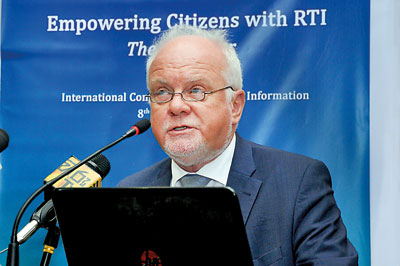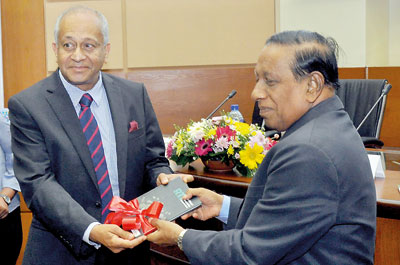News
RTI law: One year track record impressive, but long way to go
One year after the Right to Information (RTI) Act came into effect, Sri Lanka’s track record of that law which gives every citizen access to information is impressive and looks promising where ordinary citizens, civil society and media make use of it for various purposes extensively, foreign delegates observed at an international conference on RTI this week.

Norway's Ambassador and chief guest Thorbjorn Gaustadsaether
The two-day international conference on the Right to Information, themed “Empowering Citizens with RTI — the first year”, organised by Sri Lanka Press Institute (SLPI) in collaboration with the Norwegian Embassy concluded this week in Colombo. The conference saw many foreign delegates, representatives of civil society, journalists and students come together to capture lessons learnt of the RTI practice in other countries and explore other ways to strengthen the progress of the law.
Wrapping up the two-day conference with the Rapporteurs report, the delegates who came from India, Pakistan, Mexico, Norway, Bangladesh and Myanmar to share their RTI experiences, noted that compared to other South Asian countries, Sri Lanka’s implementation process of RTI was commendable though many challenges lay ahead to ensure transparency in the governance and government being held accountable by its citizens.
Venkatesh Nayak, Programme Coordinator of Access to Information Programme, attached to Commonwealth Human Rights Initiative, a Non Governmental Organization (NGO) in India said that identifying the challenges could be the first step towards finding a solutions in an amicable way. “This law belongs to everybody in this country, even members of Parliament, government officials will use it someday or the other. The law is not just for the people — outside of the government machinery.
“The Srilankan media are very promising as it picked up the RTI law as an effective tool for in-depth reporting. I hope more and more journalists will make use of the RTI frequently for their news reporting,” he said.
To enrich the extensive coverage on RTI related stories in the public space, Rapporteur Nayak also suggested the possibility of allocating a weekly column in major daily publications on RTI-related stories to educate the people on how effectively they could access government information.
“It is important to work continuously — that’s the only way to take the RTI regime forward. The RTI Commission, Civil society, media and the government have to come together and ensure that RTI becomes a success.
“Sri Lanka has the highest ranking RTI law compared to other countries in the world, and most certainly in the South Asian region. So the current challenge is to ensure the implementation of that law,” he said.
He recalled remarks made by Thilaka Jayasundara, Additional Secretary to the Finance Ministry that the Secretary approved a proposal to publish budgetary statutes and expenditure documents online for public usage. Mr. Nayak expressed hopes that there was a strong possibility of similar proactive disclosure of government information in many other institutes. “This could be a way of ordinary citizens having a dialogue with the government.”
From the supply side of information from state machinery, he indicated Norway as perfect example for proactive disclosure of information through digital media where people could access official government records online at any time they wished to.
The much expected international conference started on Tuesday with the opening statement being made by Sri Lanka Press Institute (SLPI) chairman Kumar Nadesan.
He said that at this stage it was mainly journalists and lawyers who made use of the RTI Act. The full effectiveness of this law would be demonstrated only when citizen exercised their legal rights to seek information from public authorities on matters that affect them, he said.
Mr. Nadesan observed that newspaper editors would need to play a major role in encouraging journalists to use the RTI process in writing their news stories. Such practices would enhance the credibility of their newspapers.
Norway’s Ambassador and chief guest Thorbjorn Gaustadsaether said that the right to access information and the freedom of expression played a key role in making a country’s citizens happy and satisfied. “Having strong RTI laws encourages people’s participation in government and promotes cooperation, transparency and trust between the people and those elected by the people,”he said.
While expressing delight that Sri Lanka had reached third place in the RTI global index maintained by the Center for Law and Democracy and the highest position in South Asia, Ambassador Gaustadsaether stressed that “while we celebrate this milestone, it is important to bear in mind there is a long way to go in terms of raising awareness of RTI.”
“RTI laws are only as good as their users and they depend on public, the media, and civil society to make use of them to have an impact. If not, the Act as well as the constitutional right to information would be obsolete,” he said.
The two-day international conference had seven sessions of panel discussions under various topics related to RTI and how it could be used effectively by many people to address their personal issues and how other groups such as the media and civil society could use it to resolve common issues faced by people.
| SLPI launches “RTI; Making the News” | |
| To coincide with the International Conference on Right to Information (RTI), the Sri Lanka Press Institute (SLPI) launched a book titled “RTI; Making the News” at the end of the 1st day of the conference.  SLPI Chairman Kumar Nadesan hands over a copy of the book to RTI Commission Chairman Mahinda Gammanpila SLPI Chairman Kumar Nadesan handed over a copy of the book to RTI Commission Chairman Mahinda Gammanpila. Mr Nadesan, in a message in the publication, says, “Many believe that this Law is only for journalists. It is not so. Nevertheless, it is a Law that gives journalists a new instrument by which they can unlock official secrets and ferret out information on behalf of the citizens.” The 112-page book contains selected news stories of public interest that appeared in the local press, based on RTI applications. It also contains a sample collection of RTI-based stories from the international press, and details of several appeals adjudicated by the RTI Commission in its first year of operations. The book has been compiled by SLPI and the project was funded by Kopinar, Norway, the Norwegian Union of Journalists and the Royal Norwegian Embassy in Colombo. |

